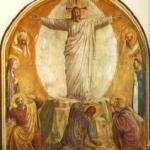The Parable of the Sheep and the Goats is about the judgment of “the nations” (or “goyim” to use the Hebraism that lies behind that translation. It is a term that refers to those “outside the covenant people”. For Jews, it meant Gentiles. For Christians, its meanng shifts to “those outside the household of faith”.
The hopeful implication of the story is that salvation does not extend merely to those in visible communion with the Church. None of the saved sheep had the slightest idea they were serving the King when they stand before him on Judgement Day. “Lord, when did we see you hungry, thirsty, naked, sick, a prisoner?” they all ask. They just thought they were doing the decent thing. They had no clue that in serving the least of these, they were rendering love and even worship to Jesus Christ himself. They may well have thought themselves atheists. They might have held any number of stupid philosophical opinions that were in error. Jesus doesn’t care. They had it where it counted: they loved their neighbor and, in their neighbor, they loved God.
That’s the upside of this parable of Judgment. The downside is the terrible warning we are given through story of the fate of the goats (for, of course, the parable is meant for us, not for the fictitious goats in the parable).
I was thinking of that warning the other in connection to Jesus prayer for his murderers from the cross, “Forgive them, Father. They know not what they do.”
We tend to hear that prayer as exculpating the guilty since we tend to assume that “They know not what they do” means that the guilty are acting in some sort of exonerating ignorance, much as we say of the child that “he doesn’t know any better”.
But I’m not so sure.
Think about it. How does the plea, “We didn’t realize it was You, Lord God of the universe. We just thought it was some powerless nobody we were torturing to death” sound to you? “We just thought it was somebody we could traumatize and butcher with impunity. Not the all powerful Judge of the universe. We would never have beaten somebody into shock and then spiked them on a cross and laughed while they died if we thought we would not get away with it” does not sound very exonerating to me. It sound more damning to me, not less.
And, of course, the whole point of the parable is that every powerless nobody is, in fact, Christ in disguise. How we treat them is exactly the same way we treat Christ crucified. And his response is the same: forgive them, Father.
What then of the end of the parable? Is God schizophenic?
No. The end of the parable is the end of the story of the cross. We separate ourselves from God. The goats depart from the king into everlasting fire because they reject him. Nobody in hell wants to be in heaven. All in hell have what they insist on: their own way. Hell is not extrinsic to sin. It is sin in fruition. We are punished by, not for, our sins. God’s will is always for our forgiveness.











